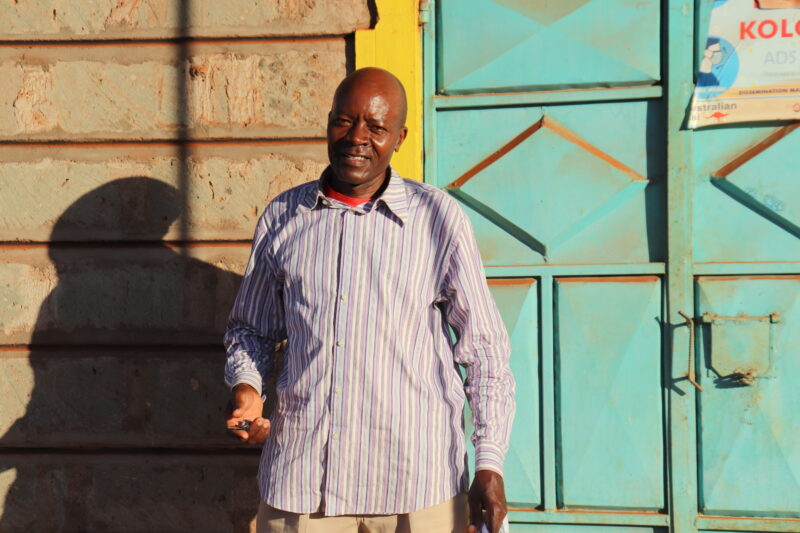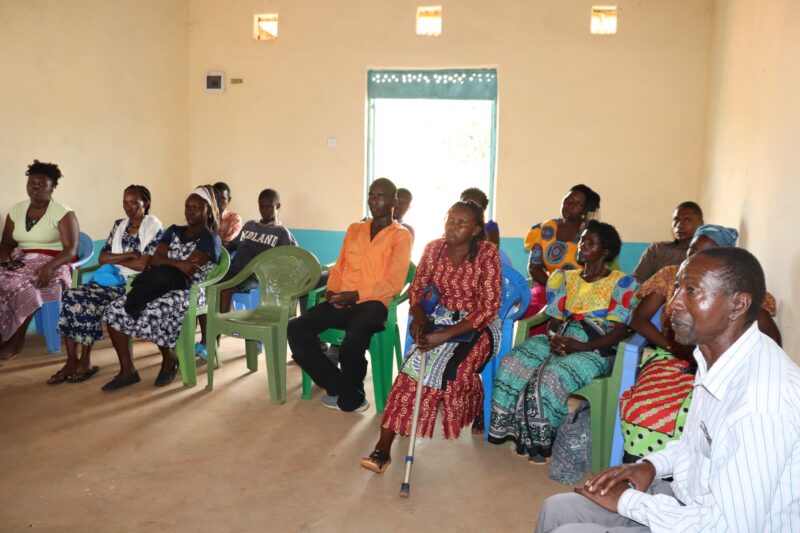ABM Archive Website
THIS WEBSITE CONTAINS ARCHIVE MATERIALS FOR HISTORICAL REFERENCE ONLY
For up-to-date information, including our latest appeals, news, and resources, please visit our current website.
SUSTAINABLE LIVELIHOODS PROGRAM
How ABM works at the grass roots of local communities
Part 2: Kyumbuke Development Community-based Organisation
Last month, ABM published an interview with Josephine Mutava, Chairperson of Kiangini CBO. This month we talk to Benjamin Muli Malawa, Chairperson of Kyumbuke Development Community-Based Organization (CBO) located in Kuya, in Kenya’s Machakos County.
Both Community-based Organisations (CBOs) are supported by ABM through our local church partner, Anglican Development Services, Eastern (ADSE).
Benjamin’s story is one of a community transforming itself by working together and being given access to the right information.

Benjamin Muli Malawa, Chairperson of Kyumbuke CBO. © ADSE. Used with permission.
ABM: What was it like in the beginning?
Benjamin: Kyua is a place of frequent drought, resulting in lack of food and water, ensuring we were high on the poverty index.
So we were very happy when ADSE carried out consultations with our local leaders and local government administration and agreed to work together for a period of five years to help us address the problems affecting our lives as community.
Our CBO is made up of 18 groups totalling 514 people (139 men and 375 women). We were trained in good governance, how to lead groups and how take part in communal decision-making.
As CBO Chair, I have been coordinating the planning of group activities and monthly meetings to discuss the progress of the projects and to make plans. When it comes to the implementation of the projects, the community offers non-financial contribution while ADSE offers financial and technical support, since it is our role to ensure the success of each project.
ADSE helped us build linkages to different government ministries, who now provide technical support where our CBO has gaps in capacity.
ABM: What would you describe as Kyumbuke Development CBO’s greatest successes?
Benjamin: Our greatest success was coming together to form the CBO. This has increased cohesion among the people of Kyua and we are very happy. We now see many development partners wanting to work with us and even the national and county government through the different line ministries. Kyua, being at the border between two counties, had been left behind when it came to development. But now there is a great improvement. People want to come together and work together to have the Kyua we envisioned in the beginning.
Over the period, ADSE has trained us in different water harvesting techniques. We have participated in construction of water structures, offering support to schools with plastic water tanks and hand-washing kits. The communities have been sensitized on the importance of keeping the environment clean and on general hygiene and sanitation practices and they have now placed hand-washing stations in their own compounds.
The groups have also been trained in different agricultural technologies and the farmers have already started planting drought-tolerant crops like cowpeas, green grams [mung beans] and sorghum which was initially not planted in the area. We are also using water conservation structures like zai pits for planting crops and vegetables, to conserve soil and water. This has helped farmers increase their productivity. They also save money and have better nutrition through consumption of fresh vegetables.
Environmental conservation has been highly beneficial to the farmers since groups like Kima have been trained and supported in establishing tree nurseries. They benefit through the sale of trees and have also planted more trees in the area. Schools have also planted shade trees in their compounds. This provides a good learning environment for the pupils who have developed a culture of tree planting.
After receiving training, 11 village savings and loans groups have been formed. This enables people to get loans to support their farming activities which they pay back with 10 percent interest.
Since we started with ADSE, our CBO has constructed three sand dams which brings clean water closer to the surrounding communities.
ABM: What are you planning for the future?
Benjamin: One of the things which has affected farmers in the region is the issue of brokers, where farmers have to sell their farm produce at a throwaway price after harvest. Since most of the people here get their income from sale of farm produce, it would be a great improvement if they could store their food and sell when the prices are better and also have a voice on the prices. So we as the CBO are planning to form collective units where we can store our farm produce and sell collectively at the right time and be able to get better price.
Because we have an action plan of what we want to do and where we want to go, and our guiding constitution provides us a road map, we have been successful so far. Without the opportunity to come together in groups and as a CBO, many of our members would not have had the opportunity to develop themselves by learning various skills from different trainers and alternative approaches.
We also have a conflict resolution committee that deals with issues arising in groups and the CBO generally, and this ensures that any issues are resolved peaceably.
ABM: How are you taking advantage of the linkages that ADSE has helped you to make?
Benjamin: So that we can make the most of available assistance, one of our sub-committees is tasked with the responsibility of identifying new opportunities and pursuing them on behalf of the CBO. We are therefore able to link to other development partners like Hand in Hand Kenya and Farmers Input Promotions Africa. These organizations have been offering trainings to the groups in conservation agriculture, poultry production, table banking and giving some farmers inputs like drought tolerant crops.
We have written a proposal to Davis & Shirtliff, a water company and a service provider under their Corporate Social Responsibility (CSR) to be supported with a solar powered pump for Mlolongo borehole. This will help the people get access to water from the borehole at a cheaper cost. We have also worked closely with Agricultural Technology Development Centre (ATCD) in Machakos to train our Kamathi self-help group and CBO group representatives on conservation agriculture. ATDC has also promise to give the CBO a thresher for post-harvest handling of different crops.
The County government, through the Ministry of Agriculture, has supported our farmers with farm inputs like seeds, pesticides and trainings in conservation agriculture. Fourteen of our CBO groups have already submitted proposals to the county government to be funded for different enterprises and already eight groups have received approvals for their proposals and will be receiving funding, God willing.

Wendano wa Kyua Self Help Group at one of their meetings. © ADSE. Used with permission.
ABM: How have you ensured that everyone gets the chance to take advantage of these benefits?
Benjamin: Before the project began, people living with disabilities didn’t have access to services they needed and were often left out of development activities. ADSE, in collaboration with the National Council of Persons with Disability sensitized our community on disability and the importance of coming together. This led to the formation of Wendano wa Kyua Self Help Group. The Association for the Physically Disabled of Kenya (APDK) together with the National Council of Persons with Disability did assessments of people living with disabilities (PLWD), assisted by specialist doctors. This resulted in PLWD being supported with disability identity cards which helps them access services. The group has been incorporated in the CBO and their chairman is a member of the Project Management Committee.
ADSE also sensitized the community in gender equality. Women were encouraged to take up leadership positions and participate in decision-making processes since they are most affected by the challenges facing us as the community. Especially in provision of household income and in women-headed households. Kyumbuke CBO has four women and three men in leadership positions. This has also gone to the community levels where the community welfare groups now also include women in the leadership positions for the first time.
I want to thank the member groups for their continued unity and participation in the developmental projects in our community. I want to thank ADSE for guiding us in different aspects. And I want to thank the Anglican Board of Mission for giving ADSE funds to support people to improve their livelihoods.
ABM would like to thank Benjamin for telling his story. We would also like to thank ABM’s supporters, and our partner, Anglican Development Services, Eastern.
![]()
ABM acknowledges the support of the Australian Government through the Australian NGO Cooperation Program (ANCP).


